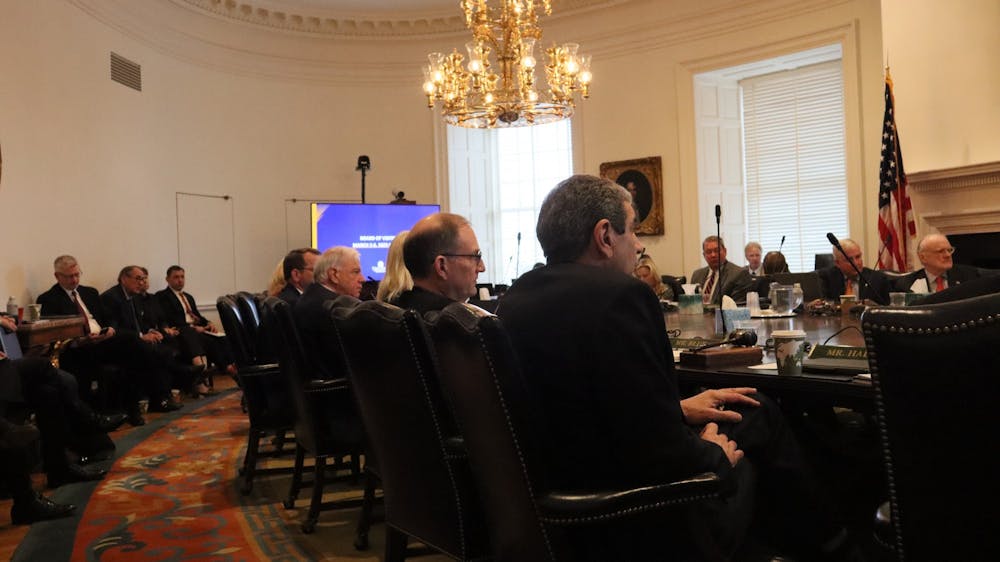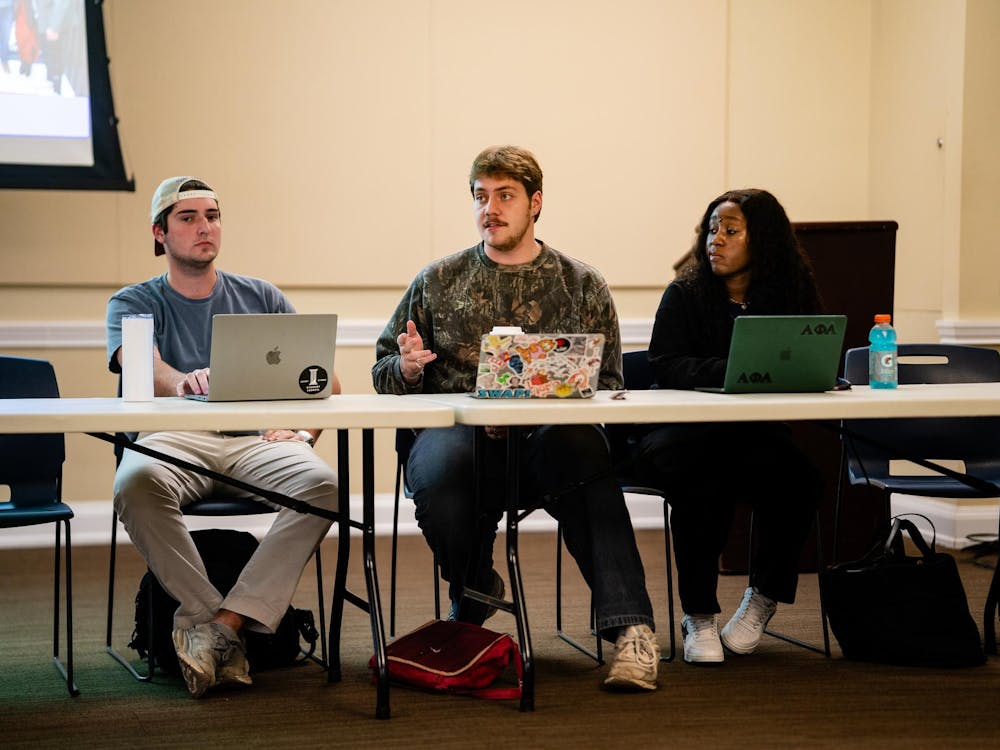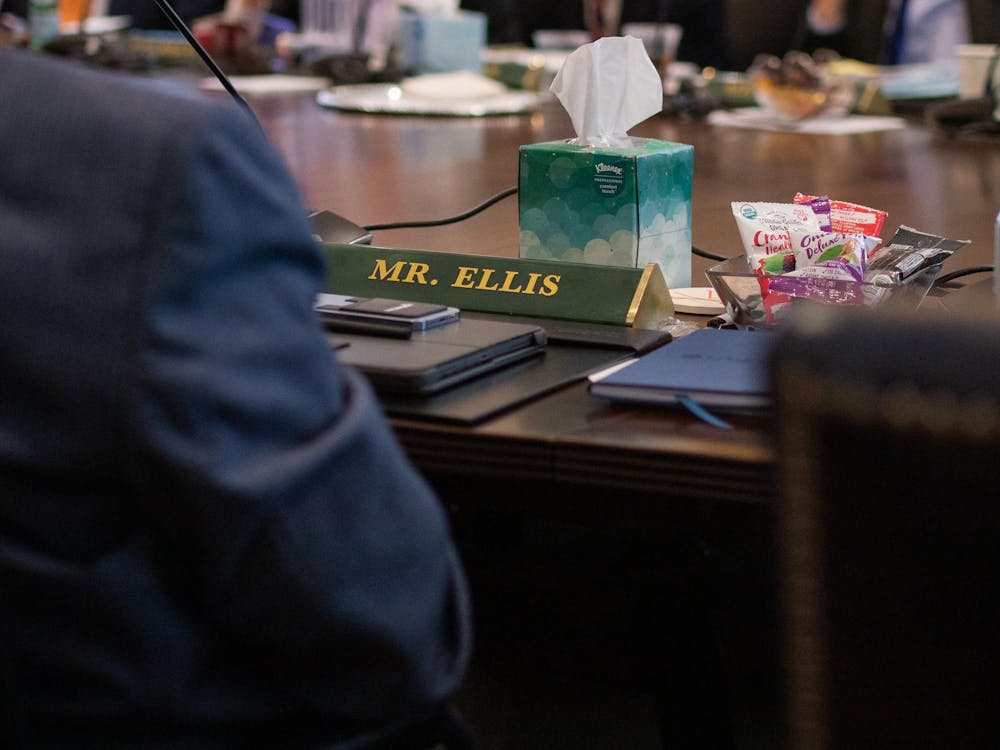The Board of Visitors’ Academic and Student Life Committee announced upcoming changes to the undergraduate advising system including new host software, the addition of a chatbot and a program specific to the School of Engineering for undergraduate advising. Also discussed during the meeting — held Thursday from 3:00 p.m. to 4:15 p.m. — was the importance of balancing the types of research at the University in addition to ways to promote civil discourse through community engagement.
Changes to the advising system include the implementation of a new software that allows students to plan for potential majors before declaring, as well as allow a student’s different advisors — including career, academic and residence life advisors —to confidentially share notes with one another.
Executive Vice President and Provost Ian Baucom said the undergraduate advising system has been revamped to better fill the important role advising plays in the success of students at the University.
“Our students come to us as whole people,” Baucom said. “They’re not segmented — they’re students in a classroom, they’re students in a residence hall, they’re students beginning to imagine a career.”
Other advising changes are the creation of a chatbot to help answer basic questions from students, as well as the introduction of small-size introductory courses in the School of Engineering, where professors serve as advisors for the students in their classes.
Additionally, the Engagements program in the College of Arts and Sciences’ New College Curriculum will be fully implemented in Fall 2023, meaning that all incoming College students will only have the option of participating in the Engagements, rather than the Disciplines Plus program. The Engagements pathway requires first-year students to take two seminar courses per semester, alongside Literacies credits and a reduced number of Disciplines credits.
Another topic of discussion was how to foster civil discourse on Grounds, in accordance with the Board of Visitors’ statement affirming the importance of free expression and free inquiry. Leslie Kendrick, director of the School of Law’s Center for the First Amendment, said the University can encourage community members to listen, have respect and engage in productive discussions.
“We cannot control the conversation in order to create more space for some and less for others but [instead] we can foster norms that approach free speech less as a cage match and more as a community endeavor,” Kendrick said.
Melody Barnes, executive director of the Karsh Institute of Democracy, also presented on the Institute’s project “Talking Across Difference,” which organizes student-focused events and offers a website with information about organizations and people to engage with to foster open dialogue. The Institute — founded to address modern concerns facing democracy — works with many groups on Grounds, including the Center for Politics.
“[The Institute hasn’t] started with partisan differences,” Barnes said. “We’ve started with the things that students have in common with one another… because out of that can come more robust, more civil discourse about issues upon which they disagree.”
In addition to advising and free speech, the Committee also discussed balancing types of research within the University. Baucom said that the University currently receives $449 million annually in research sponsorship funds. This number increased from the $325 million received in 2016.
Baucom noted only 63 percent of University research is conducted in STEM disciplines, while 75 percent to 85 percent of the University’s peer institutions’ research is STEM-based.
“We’re going to need to advance STEM [research],” Baucom said. “But we’re going to need to keep a carefully and strategically balanced portfolio of research in the data sciences, in the social sciences, and in the humanities, arts and social schools.”
The University’s investments into research will take shape in the Grand Challenges Research Investments, which will include support for areas such as Environmental Resilience and Sustainability and Precision Medicine and Health. Additionally, the Strategic Research Infrastructure Initiative will invest in staffing and infrastructure for University research.
Also during Thursday’s meeting, the Board approved the creation of two new degree programs — Education Specialist in School Psychology and Master of Education in Clinical and School Psychology — both of which will be offered in the School of Education and Human Development. The Master of Education degree will be a prerequisite for the Education Specialist degree, and both aim to prepare students to serve as school psychologists upon graduation.
Baucom also shared numbers relating to Spring 2023 final exercises, during which the University awarded 4,490 baccalaureate degrees, 447 first professional degrees and 2935 graduate degrees to graduating students. Additionally, Baucom said that the incoming undergraduate class for Fall 2023 will consist of 4,700 students — including 3,970 first-year students.
Final remarks came from Vice Provost for Enrollment Steve Farmer, who outlined the All Virginia Plan, which aims to encourage students from the 40 least advantaged schools across the state to apply to the University, as well as seek out in-state public education at large.
“There are really outstanding students at these schools, students who would thrive here,” Farmer said. “They don't yet know that the University is truly available to them, and we’re going to try to do something about it over the next several years.”
The Committee unanimously approved the Pediatric Neurology Bicentennial Professorship, which was created with a $2 million dollar donation matched by $1 million from the Strategic Investment Fund.
The original donation from Joan Thalheimer was made in the name of current Department of Neurology chair Howard P. Goodkin, and the professorship will be renamed in his honor after his retirement.The George C. and Clare F. Downing Memorial Professorship was also approved, and will create a faculty position in the College and Graduate School of Arts and Sciences. The professorship is enabled by a gift from the estate of University graduate Churchill F. Downing.
The Committee will reconvene in September.







